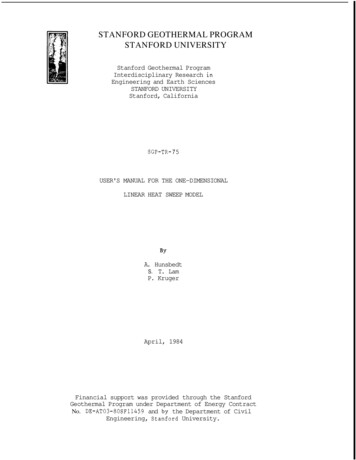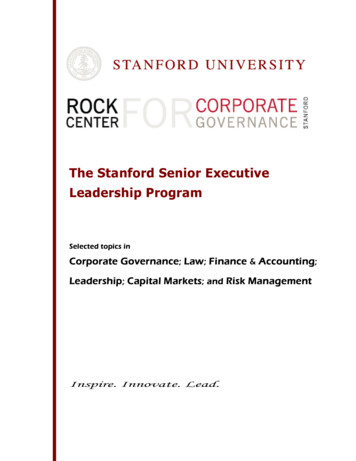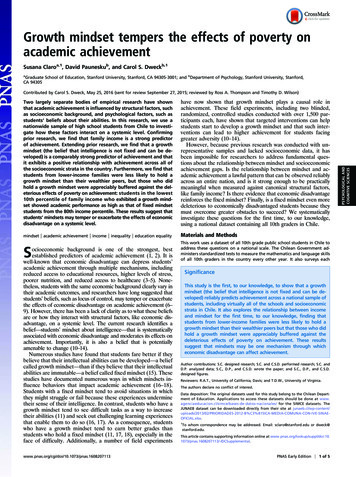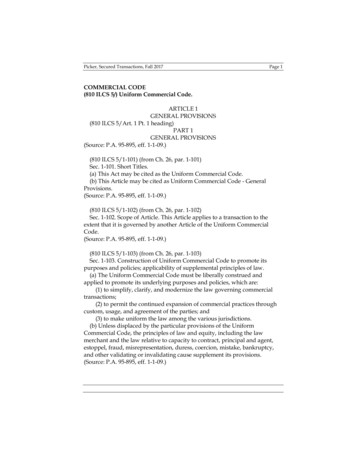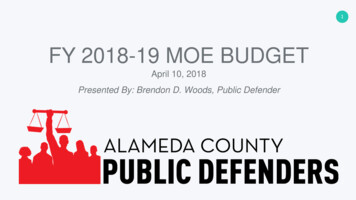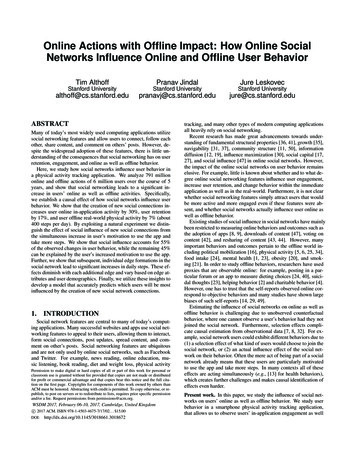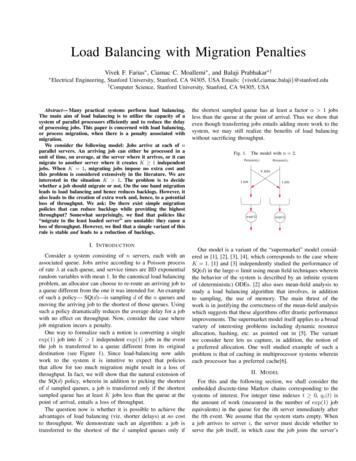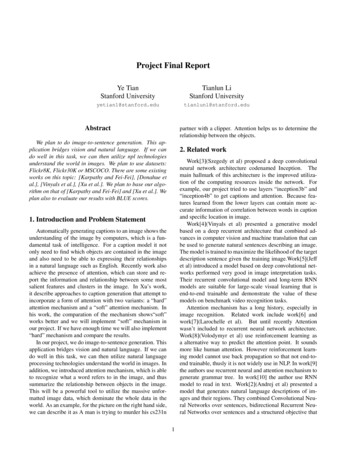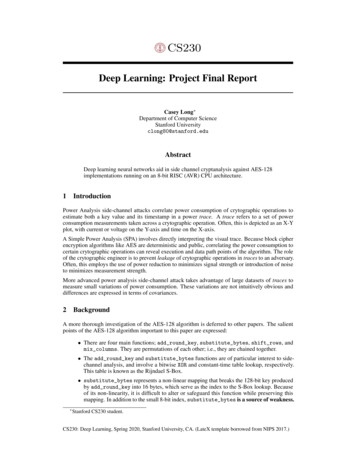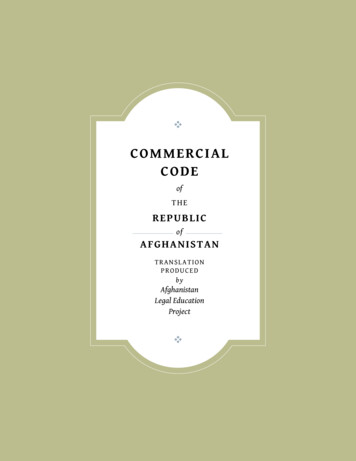
Transcription
vC OM M E RCIALCODEofTH ERE PU BL I CofAF G H A N I S T A NTR ANSLATIONPR ODUCEDbyAfghanistanLegal EducationProjectv1
C OMME RC I A L C O D EofTH ERE PU BL I CofAF G H A N I S T A N1955TRA NSLATION PR ODUCED B Y:Afghanistan Legal Education ProjectTR ANSLATOR :Elite Legal Services, Ltd.3
AcknowledgmentsStanford Law School’s Afghanistan Legal Education Project (ALEP) was launched in the fall of 2007 as astudent-initiated program dedicated to helping Afghan universities train the next generation of Afghanlawyers. ALEP’s mandate is to research, write, and publish high-quality, original legal textbooks, andto build an equally high-quality law curriculum at the American University of Afghanistan (AUAF).During the process of writing its sixth textbook, An Introduction to the Law of Obligations ofAfghanistan, ALEP discovered the palpable need for a professional and reliable English translation ofthe Afghan Civil Code. ALEP mobilized its resources to create a translation of the highest quality for useby Afghan and international government officials, universities, legal organizations, private lawyers,and the public. Based on the enthusiastic reception of the Civil Code translation, ALEP committed tocreating an English translation of the Afghan Commercial Code.The ALEP team would like to acknowledge the individuals and institutions that have made thistranslation of the Commercial Code possible. First, ALEP is grateful to Elite Legal Services (ELS), Inc.,a legal translation company based in Kabul, Afghanistan, that put the translation through severalrounds of vetting and additional translation. Masoud Ahmeullah of ELS deserves special thanks forhis coordinating role. The ALEP team also acknowledges the assistance of the dynamic faculty of theLaw Department at AUAF, particularly Professor Nafay Choudhury and former Professor RohullahAzizi, who taught the inaugural Law of Obligations class and identified the need for reliable Englishtranslations of key Afghan codes. Mr. Azizi reviewed ELS’s early drafts of the translation and providedhelpful feedback, for which ALEP is grateful.Additionally, publication and dissemination of the translation would not have been possible withoutthe efforts of several actors. Design consultants, Daniel McLaughlin and Paula Airth of DeJure Design,made the document user-friendly by incorporating hyperlinks from the Table of Contents to individualarticles and by improving the visual design. Executive Director of the Rule of Law Program, Megan Karsh,facilitated the entire translation, vetting, and design process from start to finish. Among the manyways that Ms. Karsh adds value to ALEP, both analytical and practical, her profound understanding ofthe importance of three concepts – “initiate,” “implement” and “finish” – stand out in this project.Finally, ALEP would like to acknowledge the administrative and programmatic support providedby the current Stanford Law School Dean Elizabeth Magill, former Dean Larry Kramer, and DeborahZumwalt, General Counsel of Stanford University and member of AUAF’s Board of Trustees, all ofwhom were instrumental in helping to establish and to continue the project. ALEP would also liketo acknowledge the unwavering support of its activities by AUAF’s President, Dr. Michael Smith, andthe administration of AUAF.Erik Jensen, Faculty Advisor, ALEPPalo Alto, California, November 20145
Commercial Code of AfghanistanBook One - General Rules101010111316181922232323Book Two - Commercial 9727374Book Three – Commercial Papers77777778Chapter One – IntroductionChapter Two - Commerce and Commercial CapacityChapter Three – Commercial TransactionsChapter Four- Registration of BusinessChapter Five - Business TitleChapter Six – Illegal CompetitionChapter Seven – Commercial BooksChapter Eight – Business AgentsChapter Nine – Commercial Traveler AgentsChapter Ten – SalesmenChapter Eleven – BrokerageChapter One – General RulesChapter Two - General PartnershipPart One - General RulesPart Two - Relationships among PartnersPart Three - Relationships of Partners with Third PartiesPart Four - Dissolution, Division, Expulsion of Partners and Joining another CompanyPart Five - Liquidation of General Partnership CompaniesChapter Three – Limited Partnership CompaniesPart One - Nature and Method of Formation of Limited Partnership CompaniesPart Two - Relationships of Partners with each OtherPart Three - The Relationships of the Partners with Third PartiesChapter Four – Joint Stock CompaniesPart One - Nature and Method of Formation of Joint Stock CompaniesPart Two - The Board of DirectorsPart Three - Board of SupervisorsPart Four - The General MeetingPart Five - Share CertificatesPart Six - BondsPart Seven - Loss of Share Certificates and BondsPart Eight - Dissolution and Liquidation of Joint Stock CompaniesPart Nine - The Profit and Loss AccountChapter Five – Joint Stock Partnership CompaniesChapter Six – Limited Liability CompaniesChapter One – Bill of ExchangePart One - Creation and Format of Bill of ExchangePart Two - Endorsement6
Part Three - AcceptancePart Four - GuaranteePart Five - ExpirationPart Six - PaymentPart Seven - Recourse Due to Non-Acceptance and Non-PaymentPart Eight - IntermediatePart Nine - Number of Copies of Bills of ExchangePart Ten - Forgery - AlterationPart Eleven - Lapse of TimePart Twelve - General RulesChapter Two - Promissory NotesChapter ThreePart One - ChequesPart Two - EndorsementPart Three - GuaranteePart Four - Presentation and PaymentPart Five - Crossed Cheques and Cheques Transferable to AccountsPart Six - Recourse due to Non-PaymentPart Seven - Multiplicity of Copies of a ChequePart Eight - Forgery and AlterationsPart Nine - Lapse of TimeChapter Four – Loss of Commercial PapersBook Four – Commercial ObligationsChapter One – General RulesChapter Two – Commercial ContractsPart One - Formation of ContractsPart Two - Interpretation of Commercial ContractsPart Three - Means of Proving Commercial ContractsChapter Three – Commercial SalePart One - General RulesPart Two - Certain Particular Commercial SalesChapter Four – Commercial LoanChapter Five – Commercial MortgageChapter Six - Assignment of ClaimsChapter Seven - Current AccountChapter Eight – Deposit in Public WarehousesChapter Nine – Commercial AgencyChapter Ten – Commission AgencyChapter Eleven - Transportation Commission 98981011011021031031031091131141161171191221251297
Chapter Twelve – TransportationPart One - General RulesPart Two - Transportation of PropertiesPart Three - Transport of personsChapter Thirteen - InsurancePart One - Insurance General RulesPart Two - Property InsurancePart Three - Fire InsurancePart Four - Transportation InsurancePart Five - Life InsurancePart Six - Accident InsurancePart Seven - Agricultural InsurancePart Eight - Theft InsurancePart Nine - Lapse of Time8130130131137138138139144145146148149149149
BOOK ONE - GENERAL RULESChapter One – IntroductionArticle 1:Provisions of the Commercial Code shall apply to all commercial transactions.Article 2:Commercial disputes shall be settled in accordance with legally binding agreements and, in theirabsence, by reference to explicit or implicit meaning of commercial laws. If the dispute may not besettled in the said way, commercial customs and practices shall apply. Local and special customs andpractices shall be preferred to general customs and practices. In the absence of customs and practices,provisions of other laws to which attribution is made shall apply.Note: Preference of local and special customs and practices to general customs and practices shallmean that commercial custom and practice of each locality shall be subject to transactions of the area,not those of other areas. If local customs and practices that are effective on commercial transactionssettlement do not exist, attribution shall be made to customs and practices of the nearest locality.Article 3:If no other explicit provision is stated in this Code, the order specified in the content of Article 2 shallbe mandatory.Chapter Two - Commerce and Commercial CapacityArticle 4:Every individual who has attained the age of eighteen and there is no legal impediment to his legalactions in terms of personality and kind of business may engage in commercial activities.Article 5:If a business enterprise has been passed to a minor, in case the relevant commercial court considerscontinuation of the business by his guardian or executor beneficial, it may authorize the guardian orexecutor to continue the business. If the guardian or executer does not have legal capacity to commerceor is prohibited from conducting business, he shall not be permitted to run the business until anotherexecutor or guardian who has the capacity to commerce shall be appointed.Article 6:The rules of Article 5 shall apply to other persons who lack legal capacity.Article 7:All persons who are, under the Law of Promotion and Retirement of Civil Servants, considered asemployees of the State are prohibited from engaging in direct commercial activities.10
Article 8:Any person, including individuals and corporations, who has legal commercial capacity and engages,in his own name, in one or more commercial transactions and makes this occupation as his usualprofession shall be considered trader.Article 9:A person who has chosen and opened a center for his commercial transactions and advertised for thepublic through circular letters and the press shall be considered a trader even if his usual professionis not commerce.Article 10:A person who has randomly conducted a commercial transaction shall not be considered a trader, butthe effected transaction shall be subject to rules of the Commercial Code.Article 11:The Government and municipalities may engage in commercial activities, but they may not beconsidered as traders, though their commercial transactions are subject to rules of this Code.Article 12:Persons whose commerce are based more on their physical endeavors than on cash capital or outcomeof their business is so little that it just suffices for sustenance, whether they conduct the business at ashop or a specific place in the market or by moving around, they shall be considered as small traders.Article 13:Small traders shall not be bound to choose a business title and keep commercial books and registerother items that have to be registered according to the Commercial Code and neither are they subjectto the bankruptcy rules.Note: Those who are included in one of the guild classes and hold a guild license shall be recognized assmall traders.Chapter Three – Commercial TransactionsArticle 14:If trader or non-trader persons purchase movable properties for sale or lease to others and sell or rentthose properties in their original or altered form, this sale or rent shall be considered as a commercialtransaction.Article 15:If trader or non-trader persons rent movable properties for the purpose of renting them, the rent ofsuch movable properties shall be considered as a commercial transaction.Article 16:If trader or non-trader persons employ individuals for the purpose of hiring them out to anotherperson, hiring out the act and work of the employee who is employed on this basis shall be consideredas a commercial transaction.11
Article 17:If a landowner or farmer sells his land products or a cattle-raiser sells his animal products, this saleshall be an ordinary transaction and also if a farmer transforms the form of his land products by amachine, according to his agricultural industry, and sells them or a craftsman produces his industrialproducts, himself or by hiring laborer or by using a machine, and sells them or an author publishes andsells his works, all such actions shall be considered as ordinary activities. But if a person opens, withthe purpose of selling or transforming the form of his agricultural and animal products, a permanentestablishment that possesses qualities of an industrial commercial establishment, transactions of suchan establishment shall be considered as commercial.Article 18:The following transactions shall be commercial:a. Undertaking to provide any kind of movable properties and undertaking and accepting any kindof acts and speech actsb. Establishing publishing house, photo gallery, printing journals and selling booksc. Opening theater, cinema, playhouse and opening public places such as hotel, inn, restaurant andthe like and employment offices and auction centersd. Transporting passengers, animals and goods via land, air and watere. Distributing water, gas, electricity and establishing telephone telecommunicationArticle 19:The following transactions shall be considered commercial notwithstanding the intention of partiesto the transaction:a. Commission workingb. Brokeragec. Transactions of bills, drafts (whether payable to a named payee or the bearer) and chequesd. Money exchange transactionse. Transactions by private and public banksf. Current account transactions and their relevant agreementsg. Transactions relating to mortgaged deeds and receipts of goods existing in general commercialwarehousesh. Establishing commercial companies and sale and purchase of sharesi. Concluding any kind of insurance contract against risks whether in return for fees or on reciprocaltermsArticle 20:Any transaction of a trader shall be considered as commercial unless it is proved that it is ordinary.12
Article 21:If a contract is commercial for one of the parties, provided there is no statements to the contrary in thelaw, rules of the Commercial Code shall apply to obligations of the parties deriving from this contract.Article 22:Duties of trader and non-trader persons deriving from other transactions or from transactionscomparable, by nature, to those specified in this Chapter, shall be subject to rules of the CommercialCode.Article 23:All transactions relating to transactions specified in this Chapter shall be considered as commercialtransactions.Chapter Four- Registration of BusinessArticle 24:There shall be an Office under the title of Business Registration supervised by the courts in charge ofsettling commercial cases.Article 25:The Business Registration Office, under the supervision of the president of the relevant court, shall bevested with a responsible and authorized officer.Article 26:If there are several commercial courts in one locality, the Business Registration Office shall be placed,by order of the competent authority, under the supervision of one of them.Article 27:Items and transactions that must, according to the Commercial Code and other laws, be registered shallbe registered and recorded directly or upon order of relevant authorities or on request and recourseof other concerned parties. Any changes occurring to the mentioned items and transactions shall beregistered and recorded according to the rules.Article 28:Traders and commercial companies shall be obligated to register the following items:a. Name (of person or company)b. Father’s namec. Place and date of birthd. Nationality of person or firme. Business titlef. Object of businessg. Kind of company and its date of establishment and principal centre of the company13
h. Capital of company (individual traders shall be exempted from this item)i. Persons authorized to sign on affairs of the firm or companyj. Any other specifications that shall be mandatory (in principle) to be registeredArticle 29:As the concerned persons may request the registration and record, registration shall also be carriedout upon request of the heirs or their legal successors.In case several persons are competent to request the record and registration, if the transaction isregistered and recorded upon the request of one of them, it shall be considered as though all of themhave requested it.Article 30:As registration and record of transactions may be carried out by personal request of the concernedparties or by request of their legal agents, it shall also be carried out by sending papers and documentsformally arranged including the request of registration.Article 31:A request for record and registration shall have to be made within the period prescribed by the law.If no such period is explicitly specified by the law, it shall have to be carried out within one monthsince the date of completion of the documents. For persons who are obligated to register but theylive outside the registration zone, due to the distance, one day for each 12 Mills shall be added to thementioned period.Article 32:The registration that can be proclaimed shall be published, until a special gazette is established forlegal proclamation, in official or private newspapers existing in the locality. In case there is no officialor unofficial newspaper in the locality, it shall be proclaimed in a newspaper that is published inthe closest vicinity. Except those items that may legally be published in short, the content of theregistration should be published word by word.If all the content of proclamations cannot be completely published in one day, the last date of publicationshall be considered as the date of completion of proclamation.The number and date of registration shall be recorded and maintained on all requests and declarationsthat constitute documents of registration and on newspapers in which proclamations are beingpublished.Article 33:Subjects awaiting court decisions or those on whose final registration the registration officers havedoubts shall be, upon request of the concerned parties, temporarily registered. If the concerned partiescannot prove finality of such subjects that have been temporarily registered within six months, thetemporary record shall be deleted from the register. If the finality is proved, it shall be permanentlyrecorded in accordance with registration rules.14
Article 34:If the items recorded in the register are extinguished in part or in whole, they may be, on the basis ofwritten request of the concerned parties supported by necessary documents, deleted in whole or inpart as the documents indicate. Items whose registration and record may be proclaimed, their deletionand nullification shall also be proclaimed.Article 35:Concerning administration of registration, record and amendment or deletion of the registration, theconcerned parties may appeal to the relevant court against measures taken by registration officers.The court shall examine and settle such an appeal and if measures taken by registration officers affectthird party rights, the appeal shall be scrutinized and settled by the court as a legal case in the presenceof the appellant and the third party.Article 36:Any person may study and examine the contents of the registration of a business and all the recordedpapers related thereto and request and receive a certified copy of them.Note: In such cases, a certification fee shall be charged as follows:a. One Afghani for each studyb. Five Afghanis for receiving a non-certified copyc. Twenty Afghanis for receiving a certified copyArticle 37:Those who are obligated to register an item and fail to perform their obligation within the designatedtime, shall be liable to compensate for the damage and loss hereby inflicted on another person. Moreover,they shall also be sentenced to a pecuniary punishment by the court relating to the Registration Officeon the basis of the proposal submitted by the registration officer. Such persons may appeal to the courtof appeal or the Supreme Court. Acceptance of the plead or appeal shall be subject to depositing theamount of the compensation in the court account or providing a guarantee for it.Article 38:Items registered and recorded with the Business Registration Office shall be effective against thirdparties. But if the items that are legally required to be registered but they are not registered, evenif they have been proclaimed in private, they shall not be effective against third parties, however,the person who is obligated to register may claim that other persons have had knowledge of theunregistered items and prove this claim.Article 39:Persons who, in bad faith, register untrue items shall be sentenced to pecuniary punishment orimprisonment or both punishments shall be applied to them and they shall be deprived of the right ofmembership in Chambers of Commerce and Industry and that of transacting in stock exchanges. Rightto claim compensation for damage and loss by persons affected by the crime shall be reserved and theCourt shall deal with it on the basis of request of the harmed person.15
Chapter Five - Business TitleArticle 40:Every trader shall be obligated to carry out transactions related to his business and sign papers theretounder a specific title known as the business title.Article 41:Every trader, whether trading alone or in a private partnership with another person, and also allcommercial companies shall be obliged to register their business titles with the Business RegistrationOffice of the district in which they trade or their business offices are located and proclaim theregistration.Article 42:The business title shall have to be composed of name and family name of the trader and it must beclearly distinguishable from the titles already registered. A Trader may add whatever he wishes to hisbusiness title, provided that this addendum does not create any wrong impression and false opinionamong third parties about his personal identity or about extent, importance or financial situation ofhis business or about identity of a partner among third parties.Article 43:The title of a (general partnership) company shall include the names of all partners or at least the nameof one partner together with the word “general partnership”. Title of a limited partnership company,either ordinary or its capital is divided into shares, as stated in Article 42, shall be composed of at leastthe name of one of those partners with unlimited liability and the phrase “limited partnership”.Title of a joint stock company shall consist of the object of the company and the phrase “joint stock”.As for joint stock companies, the names of partners or other persons may not be included in the title.Article 44:If a trader has already registered his business title in a locality, another trader, even having a namethat constitutes the same title, may not, unless he adds something in order to distinguish his title fromthe previously registered title, adopt as his business title the title of the first trader in the locality ofthe first trader or use for carrying out a business purpose. Also, if a trader or a commercial companywishes to open a branch in a locality other than the one in which the business title has been registeredand if there is another trader or commercial company that has been registered under the same title,founder of the new branch shall be obliged to add something to the title of the branch in such a way asto clearly distinguish it from the title previously registered therein.Article 45:As transfer of ownership of the business title by separating it from the firm is not permissible, similarly,in case of transfer of ownership of the firm, if the business title has not explicitly or implicitly beenincluded, ownership of the business title shall not be transferred.Article 46:A person who acquires the title along with the firm in one transaction shall be responsible for thoseobligations that the transferor had undertaken under that title.16
He shall also own all rights accruing from its business. Agreements contrary to this basis shall be validprovided that they are registered with the Business Registration Office or officially notified to theconcerned persons.The responsibility mentioned in this Article shall expire five years after the date of the transfer of theownership.Article 47:If a person who acquires a firm, without the business title, has not accepted, in the transfer contract,the responsibility of prior obligations of the transferor and has not registered it, he shall not beresponsible for those obligations of the transferor.Article 48:A person who acquires a business title according to Article 46 shall be obliged to add to the title a phraseindicating the succession. If the contrary is agreed, the transferor who has agreed to use the businesstitle on behalf of the transferee shall be responsible for obligations that the transferee undertakesunder the same title, provided that the enforcement office of the court has not, on the basis of therequest of creditors regarding obligations of the transferee, already ordered recovery of their claims.Article 49:In case of death of a partner whose name is included in the company title, if the successor heirs acceptcontinuation of the company, change of the company title shall not be necessary.If the heirs are not included in the company, if they agree in writing, the same title shall be retainedand also if a partner leaves the company and his written agreement is not obtained, his name may notbe retained in the title of the company.Article 50:In case of change of the business title, provisions of Article 41 shall apply.Article 51:Persons who intentionally use the title of another business unlawfully on their goods, things, files,envelopes, letters and other business packages and cargos or knowingly sell or offer for sale the goodsmarked by the title of another business shall be sentenced, with no prejudice to the rule stated inArticle 54, to pecuniary punishment or imprisonment or both.Crimes stated in this Article shall be tried on the basis of private suit. The plaintiff may, after filing theclaim, withdraw it. Withdrawal of a private suit shall also remove the public claim therein.Article 52:Offenders of Articles 40, 41, 42, and the last part of Article 43, and rules of Article 45 shall be sentencedto pecuniary punishment.Article 53:If courts, agents of Chambers of Commerce and Industry, officers of the Registration Office, and otherconcerned officials, in the course of implementing their duties, find out that a business title has notbeen registered and it has been used contrary to Articles 40, 41, 42, and 43, they shall be obliged toreport the event to the relevant authorities.17
Article 54:If a business title has been used, in any way, contrary to rules specified in this Chapter, the concernedpersons may request prohibition of its use or, if it was registered, request its invalidation. Moreover,persons who have suffered losses due to the mentioned (intentional or mistaken) use may claimcompensation for their loss. The court may, if necessary, on the basis of consultation with the experts,scrutinize the circumstances and characteristics of the event and issue, on its discretion, a ruling.Furthermore, the court ruling may, subject to a request by the harmed person and payment of theexpenses by him, be published.Chapter Six – Illegal CompetitionArticle 55:If a trader uses marks or names that are mistaken with marks and names that have been rightfullyused by another trader, the use of such marks and names shall be prohibited by the first-mentionedtrader. The court may, on the basis of request of the concerned person, issue an order for removal ofthe mistake.Article 56:Any deception and conspiracy in commercial affairs shall be prohibited.Article 57:No trader may, with the purpose of competition, publish such untrue statements that harm the interestor business of another trader.Article 58:Traders shall be prohibited from publishing untrue statements with regard to the origin, quality orimportance of their goods, with the purpose of attracting customers of another trader who sells thesame goods, and they are also prohibited from proclaiming certificates and awards which they havenot held them and from using deceits and conspiracies to the mentioned purpose.Article 59:No trader shall be allowed to allure officers and employees of another trader or factory with thepurpose of receiving information about his customers and attracting them.Article 60:No trader shall be allowed to give a certificate or reference letter of good services in order to deceiveanother trader.Article 61:Any trader who takes action against the provisions of the above Articles shall be obliged to compensatefor the losses of the harmed persons.Article 62:If a commercial information agent, intentionally or by gross negligence, provides untrue informationconcerning moral conduct or financial strength of a trader, he shall be obliged to compensate for the18
material and intellectual losses sustained, due to this, by the mentioned trader. A correction statementof that information by the mentioned agent shall not entail his acquittal. The court may, at the time ofdeciding on the compensation of losses, also order that the mentioned problem be published, on theaccount of the agent, in one or several newspapers.Article 63:A trader who intentionally commits the acts specified in this Chapter shall, in addition to compensationfor losses, be sentenced to pecuniary punishment and imprisonment as well.Article 64:Punishment of the person who has repeatedly committed the act causing punishment or compensationmay be doubled or more. The criminal case shall only be filed on the basis of complaint of a concernedperson or the local Chamber of Commerce. Withdrawal of the private complaint shall extinguish thepublic rights.Chapter Seven – Commercial BooksArticle 65:Every trader shall be obliged to keep three books – an inventory book, a ledger, and a journal. Inaddition to this, he shall be obliged to regularly keep a copy of all outgoing letters and telegrams andthe original copy of all incoming telegrams and letters along with all confirmation papers.Article 66:Every trader may, if necessary and due to a need deriving from commercial transactions, keepother books in addition to the above mentioned books. But, these books shall not be subject to therequirements as specified in the following Articles.Arti
a legal translation company based in Kabul, Afghanistan, that put the translation through several . Accident Insurance 148 Part Seven - Agricultural Insurance 149 Part Eight - Theft Insurance 149 Part Nine - Lapse of Time 149. 10 . If no other explicit provision is stated in this Code, the order specified in the content of Article 2 shall .


